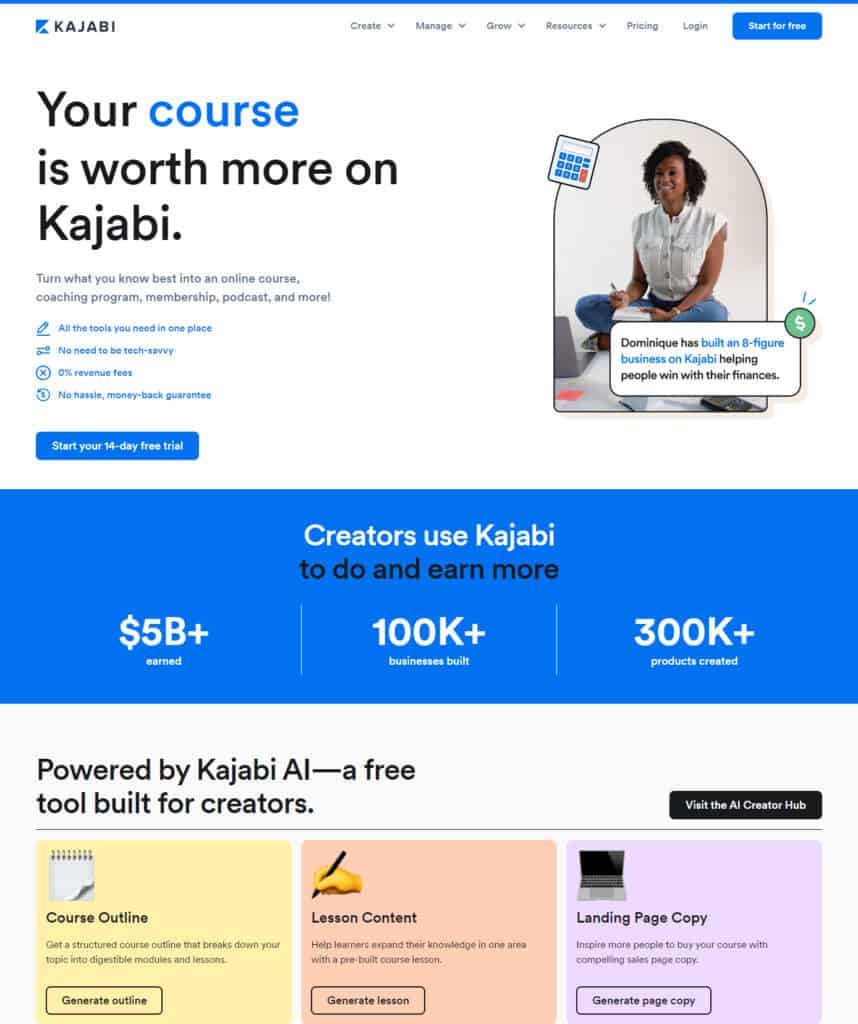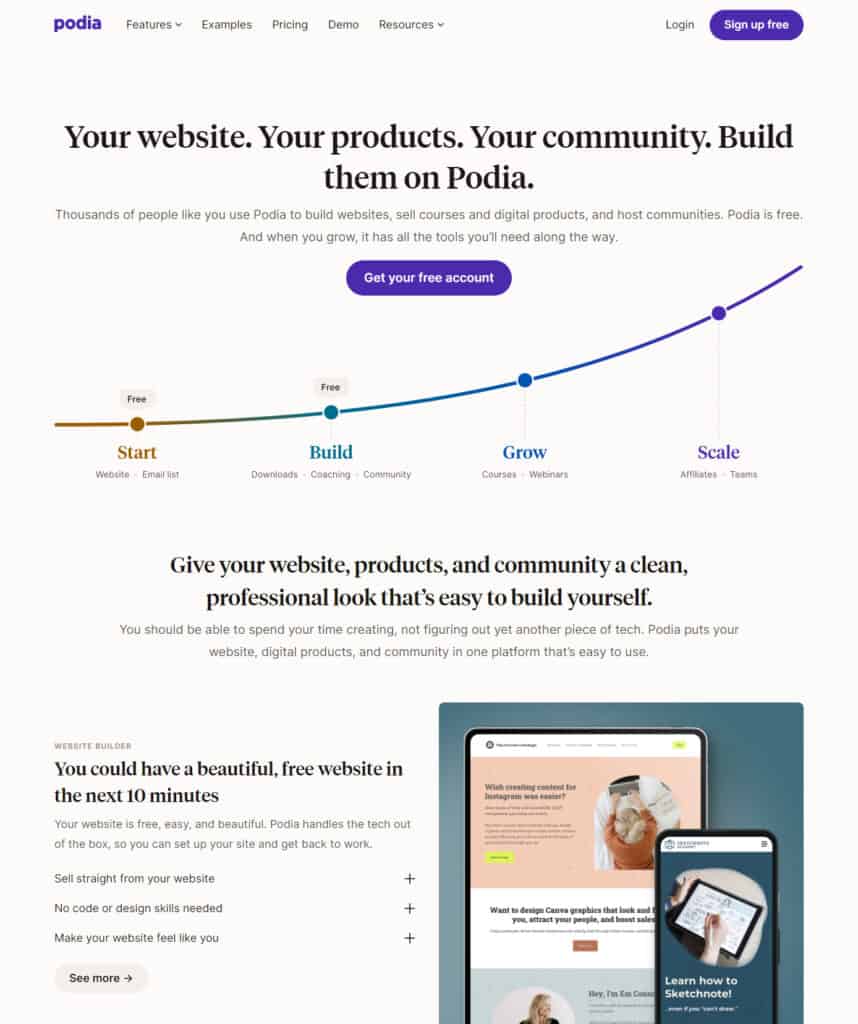Looking for the best online course platforms to bring your knowledge and expertise to a global audience?
In this article, we have curated a list of the top online course platforms that offer user-friendly interfaces, comprehensive features, and robust customization options, allowing you to create and sell online courses with ease.
Whether you’re a seasoned instructor or just starting out, discover the perfect platform to showcase your expertise and empower learners worldwide.
1. Udemy

Udemy is one of the best online course platforms and most popular. As a course creator on Udemy, you have the opportunity to design and publish courses on a wide range of subjects, reaching millions of potential students.
Udemy lets you easily upload video content, create quizzes, and engage with students through discussion boards. It also provides guidelines and best practices to help you deliver high-quality courses that resonate with learners, making it accessible for instructors of all levels of experience.
Additionally, Udemy offers marketing support to help increase the visibility of your courses. Their dedicated marketing team actively promotes courses, allowing you to reach a larger audience and attract more students.
As a course creator on Udemy, you have control over pricing and can earn revenue from course sales. Udemy’s revenue-sharing model allows you to set your own prices and earn a significant portion of the revenue generated.
Pros of Udemy
- Vast and diverse user base, offering a wide audience for instructors.
- User-friendly tools and features simplify the course creation process.
- Robust marketing support provided by Udemy helps promote courses effectively.
- Revenue-sharing model lets you set prices and earn a significant portion of the revenue.
- Udemy’s strong reputation adds credibility and trustworthiness to courses.
Cons of Udemy
- Course quality may vary since anyone can create and sell courses on the platform.
- Lack of formal accreditation or recognized certifications.
- Limited interactivity in some courses, lacking live sessions or direct instructor interaction.
- Inconsistent pricing structure, causing potential confusion for learners.
- No detailed progress tracking features, potentially affecting learners who prefer structured learning paths.
2. Skillshare

Skillshare gives you the opportunity to share your expertise and teach others in a dynamic and creative learning environment. The platform encourages instructors like you to create engaging video-based classes on a wide range of topics.
When you join Skillshare as an instructor, you gain access to their user-friendly tools and resources that make course creation a seamless process. You can upload and organize your video content, create projects and assignments for students, and interact with your audience through comments and discussions.
Skillshare also offers a supportive community of fellow instructors, where you can connect, collaborate, and learn from each other’s experiences. This community aspect enhances your teaching journey and fosters a sense of belonging and growth.
Furthermore, Skillshare lets you earn revenue through a model that compensates you based on the number of minutes watched by Premium members in your classes. Additionally, you can earn through the Skillshare Partner Program, where you can refer new students to the platform and earn a referral bonus.
Pros of Skillshare
- Create courses on a diverse range of subjects.
- A dynamic and creative learning environment with lots of teacher-student engagement
- Easy-to-use tools for course creation. It’s accessible no matter your technical abilities.
- Vibrant community of instructors where you can connect and collaborate.
- Earn revenue through multiple systems.
Cons of Skillshare
- Limited monetization options mean less revenue than other platforms.
- Skillshare courses do not offer formal accreditation or recognized certifications.
- Limited control over pricing: Skillshare sets all of the pricing.
- It can be challenging for new instructors to stand out and attract students.
- Courses often focus on pre-recorded video content, which may limit direct interaction between instructors and students.
3. Teachable

Teachable is one of the best online course platforms because it offers an intuitive and user-friendly interface, making it accessible even to those with limited technical knowledge. Course creators can easily set up their own branded websites and customize the design to match their brand identity.
Secondly, Teachable provides robust features for course management. It lets you organize and structure your content effectively, offering options for video, audio, and text-based lessons. The platform also supports quizzes, discussions, and downloadable resources, enhancing the overall learning experience.
Thirdly, Teachable facilitates seamless marketing and sales. It offers built-in tools for creating sales pages, coupon codes, and promotional campaigns. You can integrate payment gateways and process transactions securely.
Furthermore, Teachable is known as a hassle-free experience by handling hosting, security, and technical support. It also provides detailed analytics and reporting, enabling creators to track student progress and engagement.
Pros of Teachable
- User-friendly interface makes it easy to set up and manage courses.
- Personalize your course website design to align with your brand.
- Tools for organizing and structuring course content (video, audio, and text).
- Built-in marketing tools to promote and sell courses.
- Integrated payment processing.
- Various pricing and monetization options.
Cons of Teachable
- Transaction fees can impact profitability.
- The customization options may be limited, restricting your design preferences.
- Limited integration options with third-party apps and tools.
- Teachable retains ownership of all course data you create.
- Higher tiers can be expensive and cost-prohibitive for you.
4. Thinkific

As a course creator, Thinkific is one of the best online course platforms that allows you to effortlessly build, market, and sell your online courses, empowering you to share your knowledge and expertise with the world.
Thinkific’s user-friendly interface simplifies the course creation process. You can easily organize your course content, including videos, quizzes, and downloadable resources, making it convenient for your students to access and engage with the material.
The platform provides robust customization options, allowing you to brand your courses and create a unique learning environment. You can design your course site, personalize the appearance, and tailor the user experience to match your brand.
Thinkific also offers a seamless learning experience for your students. The intuitive student interface lets them navigate the course material, track their progress, and interact with you through discussions and messaging.
Pros of Thinkrific
- The user-friendly platform makes it easy to build courses without technical skills.
- Wide range of customization features, allowing you to personalize your branding.
- Robust tools for organizing and delivering course content, including videos, quizzes, assignments, and downloadable resources.
- Sales pages, coupon codes, affiliate programs, and payment integration.
- Detailed analytics and reporting features into student engagement.
- Integrates with a wide range of third-party tools and platforms.
Cons of Thinkrific
- There may still be a learning curve for new users.
- The level of design flexibility may be limited compared to other course platforms.
- Transaction fees on certain plans can impact your revenue.
- The platform’s marketing capabilities aren’t as advanced as other platforms.
5. Kajabi

Kajabi is an all-in-one platform designed to simplify the process of creating, marketing, and selling online courses. It offers a comprehensive set of tools and features to help you build a professional and engaging learning experience for your students.
With Kajabi, you can easily create and organize your course content, including videos, quizzes, assessments, and downloadable resources. The platform provides a user-friendly interface and intuitive course builder, allowing you to structure your content in a logical and visually appealing manner.
Kajabi offers a range of customization options, allowing you to personalize your course site, branding, and student experience. You can choose from various templates, customize the layout, colors, and fonts, and create a cohesive look that aligns with your brand identity.
Marketing and sales capabilities are also a key feature of Kajabi. You can create sales pages, offer upsells and promotions, and utilize email marketing automation to nurture your leads and engage with your students. Kajabi also provides analytics and reporting features to track student progress, engagement, and sales performance.
Furthermore, Kajabi integrates with popular third-party tools and platforms, enabling you to enhance your course creation process with additional functionalities and seamless integrations.
Pros of Kajabi
- Offers an extensive range of features, making it an all-in-one platform.
- No coding knowledge necessary to use Kajabi. Wide range of templates available.
- Communities allow your customers to chat and meet virtually.
- Superb training resources with hundreds of videos and articles.
- Automate repetitive tasks to streamline your business.
- 15+ native integrations to customize the website and learning experience.
- Maximize your revenue with Kajabi’s affiliate program.
- Create membership sites, podcasts, coaching programs, and other digital products.
Cons of Kajabi
- You can’t sell physical products natively, only digital products. This means you can’t sell branded merchandise or physical course assets.
- There’s a lot less flexibility compared to other platforms, especially WordPress.
- If you want advanced features, you have to pay for additional tools/integrations.
- Kajabi doesn’t have a large file history, so you can’t see older uploads.
6. Podia

Podia is a valuable platform that empowers you to build and grow your online courses. You can easily create, publish, and sell your courses, allowing you to reach a global audience. The platform provides a user-friendly interface and a range of powerful features.
With Podia, you can customize your storefront to showcase your courses, digital downloads, coaching sessions, and membership options all in one place. Podia offers a consistent template, simplifying the process of presenting your content to potential students.
In addition to selling courses, you can leverage Podia to offer supplementary resources like cheat sheets, eBooks, videos, and more as digital downloads. The platform also enables you to bundle these resources with your courses, increasing their value and appeal.
One of the standout features of Podia is the ability to create your own private membership site, where you can nurture a dedicated community of learners. You can offer different membership plans, exclusive content, and perks to engage and retain your members.
Pros of Podia
- Intuitive and easy-to-use interface to build courses without technical expertise.
- All-in-one solution with lots of features and flexibility in one platform.
- Customize your storefront to reflect your brand.
- Pre-launch your courses and collect email addresses.
- Bundle your courses with supplementary resources to provide additional value.
- You can create exclusive membership sites with different plans and perks
Cons of Podia
- Marketing tools may be somewhat basic compared to other platforms.
- The level of customizations may not meet your specific design needs.
- Transaction fees on each sale can eat into your revenue.
- Built-in assessment features for quizzes and assignments are relatively simple, lacking advanced functionalities for complex grading systems or advanced assessments.
FAQs About the Best Online Course Platforms
We’ve offered our list of the best online course platforms, but you may want to know more. Here are some frequently asked questions of the best online course platforms.
What are the best online course platforms available?
There are several top online course platforms available, each offering unique features. Some of the best options include Udemy, known for its vast course library; Coursera, offering courses from renowned universities; Teachable, providing customization and marketing tools; Thinkific, known for its user-friendly interface; and Skillshare, focusing on creative and practical courses.
These platforms cater to different needs and preferences, so it’s essential to explore their features and compare them based on your specific requirements as a course creator.
How do online course platforms work?
Online course platforms provide the digital infrastructure for course creators to design, host, and deliver their educational content to learners. They typically offer tools and features for content creation, organization, and customization, as well as functionalities for enrollment, student tracking, and assessments.
Learners access the courses through the platform’s website or app, allowing for self-paced learning and engagement with course materials and resources.
What features should I look for in an online course platform?
When choosing an online course platform, look for features such as a user-friendly interface, course creation and customization tools, multimedia support, assessment capabilities, marketing and sales features, analytics and reporting, student engagement tools, integration options, and reliable customer support to meet your course creation and delivery needs.
If your course platform doesn’t offer landing page functionality, it’s smart to use a third-party online course landing page builder.
How much does it cost to use an online course platform?
The cost of using an online course platform varies depending on the platform and the specific features and services you require. Some platforms offer free plans with limited functionalities, while others have subscription-based pricing models with tiered pricing options based on the scale and needs of your online course business.
Can I customize the appearance of my courses on online course platforms?
Yes, most online course platforms allow you to customize the appearance of your courses. You can typically personalize the branding, layout, colors, fonts, and other visual elements to create a unique and cohesive learning experience for your students.
Do online course platforms support multimedia content such as videos and quizzes?
Yes, online course platforms generally support multimedia content such as videos and quizzes. You can typically upload and embed videos directly into your course lessons, allowing students to watch and engage with the content.
Similarly, platforms often provide tools to create and incorporate quizzes, assessments, and interactive elements to enhance the learning experience. The specific features and capabilities may vary among platforms, so it’s recommended to explore their documentation or features list for detailed information.
Are there any transaction fees or revenue-sharing models associated with online course platforms?
Yes, some online course platforms may charge transaction fees or operate on a revenue-sharing model. These fees or revenue shares can vary depending on the platform and the pricing structure they have in place. It’s important to review the platform’s terms and pricing details to understand any potential costs associated with selling your courses.
Can I track student progress and engagement on online course platforms?
Yes, most online course platforms provide tools to track student progress and engagement. You can typically monitor metrics like course completion rates, quiz scores, and student activity within the platform’s analytics or reporting features. This allows you to assess learner engagement and make data-informed decisions to enhance your course content and delivery.
Are there any limitations on the number of courses or students I can have on online course platforms?
The best online course platforms may have limitations on the number of courses or students you can have, depending on the specific platform and pricing plan you choose. Free plans or lower-tier plans may have limitations, while higher-tier plans often offer increased course and student capacity.
It’s important to review the platform’s terms and conditions or contact their support for precise information on limitations.
Can I integrate third-party tools or services with online course platforms?
Yes, many online course platforms offer integration options with third-party tools and services. These integrations allow you to enhance your course creation and delivery process by connecting with tools such as email marketing platforms, payment gateways, analytics services, and more.
It’s worth exploring the specific integrations supported by the platform you choose to streamline your workflow and leverage additional functionalities.
Can I offer certificates of completion badges to my students through online course platforms?
Yes, many online course platforms offer the option to provide certificates of completion or badges to students. These certificates or badges serve as recognition for completing a course and can be customized with the course name, student name, and other relevant details. The availability and customization options for certificates or badges may vary depending on the platform, so it’s worth exploring the specific features and settings of the platform you choose.
Are there any restrictions on the types of courses or content that can be hosted on online course platforms?
Yes, online course platforms may have certain restrictions on the types of courses or content that can be hosted on their platform. These restrictions can vary depending on the platform’s terms of service, community guidelines, and legal requirements.
Common restrictions may include limitations on explicit or offensive content, copyrighted material, illegal activities, or content that promotes discrimination or harm.
It is important to review the platform’s guidelines and policies to ensure your courses comply with their requirements and align with their intended audience and educational standards.
The Best Online Course Platform for Your Needs
The world of online learning is booming, and our list of the best online course platforms will provide you with the tools and features necessary to create impactful courses.
Whether you prioritize customization options, user-friendly interfaces, comprehensive analytics, or marketing capabilities, there is a platform on our list to suit your specific needs.
Choose the best online course platform for your needs, and embark on your journey to educate, inspire, and transform the lives of your audience.
Do you use any of the best online course platforms on our list? Let us know in the comments!
Check out some more resources we’ve created that will help you create courses:
- The Best Website Builders of 2023: Top 7 Reviewed and Compared
- How to Build a DIY Video Lighting Kit (Budget-Friendly Tutorial)
- The Best Community Software to Build and Grow Your Tribe (Software Reviews)
- The Complete Guide to AI Text Generators for Creators (How They Work, Limitations, and How to Use Them)



